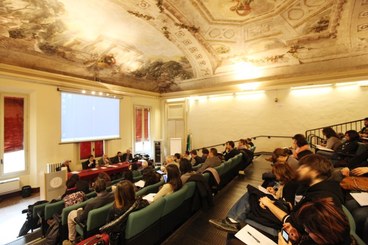Contextualizing Cleaning Platforms: The role of labor market and welfare institutions. An explorative analysis of six European Cities
Rebecca Paraciani and Giovanni Amerigo Giuliani (Unibo) present their ongoing research on cleaning platforms and their impact on local labour markets and working conditions across Europe.

-
Date: 13 MAY 2025 from 13:00 to 14:00
-
Event location: Aula Romei, Palazzo Hercolani, Strada Maggiore 45, Bologna
-
Type: CONNECT seminars
In this seminar, Rebecca Paraciani and Giovanni Amerigo Giuliani will present their ongoing research project on how labour market and welfare state institutions mediate the impact of cleaning platforms on working conditions and labour market dynamics across different European countries.
Talk Abstract
Comparative literature has mostly focused on labor costs in explaining cross-country variation in the composition of the platform economy while national institutions have been largely overlooked. Therefore, it is still unclear how the platform operational logics – theoretically uniform at the transnational level – are mediated by institutional legacies at the national level. However, there is an emerging body of research that suggests that platforms adapt and respond to institutional conditions, and thus must be studied in relation to national institutional contexts (Chueri & Törnberg, 2023; Törnberg, 2023, Funke & Picot, 2021; Picot, 2022; Valle & Schor 2020). Nevertheless, limited research has yet systematically examined the relationship between national labor and welfare institutions and the platform economy (see Thelen, 2018; Wood et al., 2019; Chueri & Törnberg, 2023; Ametowobla & Kirchner, 2023). Furthermore, when they did it, they adopted a broad focus, thus paying attention mostly on the cross-country differences regarding the structure of the platform economy in terms of the jobs performed by the platform workers (low-skilled vs. high-skilled jobs) (e.g., Chueri & Törnberg, 2023). It follows that we still know very little about how labor market and welfare institutions influence the profile (who they are, in terms of gender and race) and the behavior (in terms of their decisions in the hourly fee setting) of those workers operating in platforms providing low-skilled jobs – that is, cleaning platforms. Comparative perspective can thus shed light on the actual dynamics of platform operation on the ground of transnational platform capital, highlighting the role of national institutions and workers agency in shaping outcomes. By focusing on the case of the Yoopies platform operated in five capitals (Rome, Berlin, Paris, Stockholm and Copenhagen) of countries belonging to three different Welfare regimes (Southern, Continental, and Scandinavian), the research aims at answering the following question:
- To what extent the profile and the behavior of the cleaners in the platform economy is affected by the national labor market and welfare institutions?
- Is it possible that the level of genderization and racialization in cleaning platforms is affected by the national institutions, and therefore cross-country differences can be detected?
- Is it also possible that cleaners’ decisions in setting up their hourly fees are mediated by such national institutions?
Speakers's Short Bios
Rebecca Paraciani is currently a Post-doc Research Fellow at the Department of Political and Social Sciences, University of Bologna, where she works within the PRIN ALMADIA project - Active Labour Market Policies and Street-Level Bureaucracy: Discretion in Action. She obtained a PhD in Sociology and Social Research with a thesis on the discretion of labor inspectors in Italy and the Netherlands. Her research focuses on street-level bureaucracy and the implementation of public policy, welfare services and organizational studies, with a focus on gender (dis)equality.
Giovanni Amerigo Giuliani is a postdoctoral researcher and adjunct professor at the University of Bologna. He earned a Ph.D. in Political Science from the Scuola Normale Superiore. He is currently working on comparative projects investigating multiple inequalities in access to 0-1 childcare services and is involved in the PREDLIFE consortium’ s research activities - funded by the Academy of Finland and carried out by the University of Turku and the University of Jyväskylä - which explore paternity leave uptake in Finland. His main research interests include comparative welfare state analysis – with a particular focus on family and labor market policies – the welfare agendas of the Mainstream Right and Radical Right parties, and social stratification.